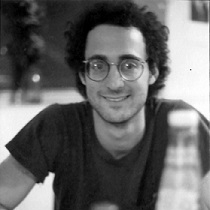No work better embraces narrative medicine than A Short Life, by Jim Slotnick. This prescient memoir, written in 1983 and published in 2014, narrates a young medical student’s terminal illness from pre-diagnosis to his final days. It is a song of life’s joys, deadly shortcuts in medical practice, the necessity of listening and paying attention, and the essential value of compassion. Slotnick’s voice and spirit are present from the start:
Dear Reader, I want to write a little book before I die that has a pulsebeat, that yawns and breathes and hisses and steams with the condensate of my life; some of its ups and downs and smiles and lies and twists and turns and ins and outs. What follows is the true story of my humble life.
This wonderful rare blend of vivid description and wry, playful humor is the book’s voice. Slotnick’s Wonderland-like journey through traditional medical appointments exemplifies our system’s failings:
…that first visit to Dr. S….contained an important lesson about modern medicine. Our doctors' ability to diagnose far surpasses their knowledge therapy. I was told by Dr. S. that I had a heartbeat pattern on the EKG machine that was ‘Very interesting. A borderline Wolff-Parkinson-White pattern.’…’Do you ever get tachycardia…?’ ‘Well, no.”’ ‘Then it means absolutely nothing. It's just a pattern.’….Dr. S. ended the exam by saying that I probably had this eye problem at birth and I was just beginning to notice it!… I left his office feeling strangely unattended.
Slotnick, in fact, had a brain tumor.
His ability to paint pictures of both his interior and external worlds is extraordinary. He visits the campus library to research brain tumors, but the experience goes far beyond reading:
I looked outside just as dusk began to fall. I felt as if blinders were being lifted from my
eyes, and I was seeing the world for the first time….Everything looked brittle. I was afraid that it all might shatter into a million pieces...the big trees being rustled by the late afternoon wind…agroup of medical students would stroll by, some from my class. We're in different worlds now…. I had crossed over into a strange land filled with tumors, prognoses, diagnoses, radiation, chemotherapy, recurrences, regrowths, remissions, and response rates.
There is bravery and stunning candor about dying:
At my tender age of twenty-eight, the imminence of death brings on feelings of anger, sadness, and frustration. My emotions reflect the pain of life's unfairness. I have also experienced a freedom and exhilaration which comes from having one foot squarely planted in the next world. Perhaps this freedom explains my choice of activity during my last days: horse-race handicapping…
He bluntly describes his body’s decline: “…The speech impediment that I have is maddening in its ability to turn any external evidence of my charm or intelligence into the type of drivel that a bunch of chimps would laugh at. My vocal chords are paralyzed….My lips and tongue no longer want to move correctly. My speech is garbled, as well as inaudible. As a consequence, I can be thinking of a great joke or put-down, but all I can produce is an ineffective semblance of my conception.”
Jim Slotnick
And finally the reckoning: “I wish that I could sum it all up with a single word. I've heard it said that every action holds within it the key to the individual….What would my word be? Cancer. No, that's not really me. I know that my cancer is made up of cells that are genetically me, but I think of this tumor as only expressing one part of me, and not a particularly pleasant part at that. The cancer is an invader, a foreigner--it isn't me. No, cancer is a big word in my life, but not the biggest.”
And it is that statement, plus Slotnick’s invaluable generosity in letting us visit the heart and soul of a dying young person that ultimately connects us with life…and the role of narrative medicine. —Wendy Miller
Wendy Miller got her Master's of Library Science from UCLA, has practiced as a medical librarian, a professional reviewer of books and restaurants, and also worked at the Los Angeles Free Clinic in the 1980s.


